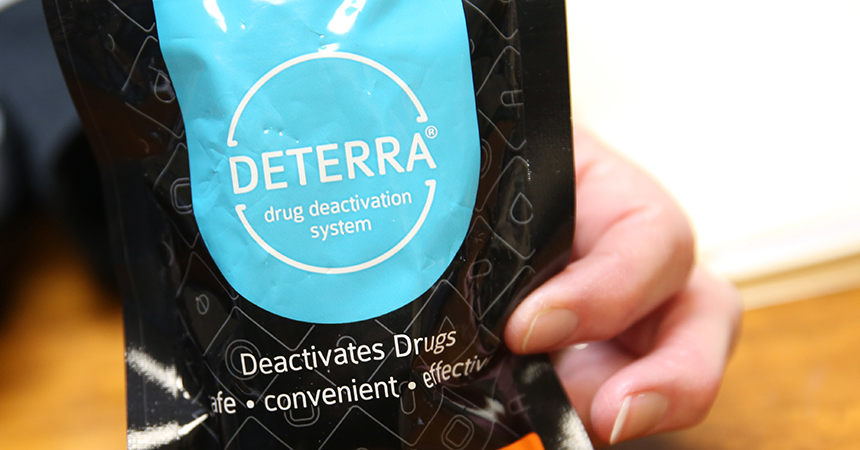HSC, Deterra launch campaign to protect families from unused medications
The University of North Texas Health Science Center at Fort Worth is launching an educational campaign to prevent overdose deaths by teaching families how to properly dispose of unwanted or leftover prescription medications.
Through a collaboration with Deterra pouches by Verde, HSC and several community partners will distribute 500 pouches, which destroy drugs when warm water is added to the bags containing deactivating pods. Deterra pouches will also be provided to some patients receiving care through HSC’s Geriatric Clinic.
Verde generously donated the pouches to HSC. Each bag can destroy up to 90 pills.
The campaign is HSC’s second major opioid overdose death prevention project this year. In January, the university distributed 9,000 doses of the overdose-reversal drug Narcan and trained students, employees and community members to administer it.
“The opioid crisis did not go away during COVID-19,” HSC President Dr. Michael Williams said. “In fact, hard economic times, isolation and stress can often exacerbate addiction problems. Now is not the time to relax in the fight against overdose deaths, and HSC will continue to lead this fight.”
The HSC, Deterra program builds on existing drug disposal campaigns and resources promoted by the U.S. Drug Enforcement Administration.
Experts maintain that it’s too easy for people struggling with addiction to find leftover pain prescriptions in the home. About 1.4 billion opioid prescriptions were dispensed between 2012 through 2017 and about 70% remain unused.
More than 6 million Americans misused drugs in 2017, and it is crucial to turn that statistic around by encouraging more people to destroy leftover drugs.
Kate Taylor, DNP, FNP-C, an Assistant Professor in the Department of Geriatrics and SaferCare Texas Clinical Executive, said getting rid of unused drugs can save lives.
“Learning how to properly dispose of unused medications is vital in the fight against opioid addiction, environmental safety, and protecting our children and others from the potential danger of access to unused medication,” Taylor said.
Samaritan House, a non-profit that helps lifts homeless individuals and families struggling with major health conditions, substance abuse and mental illness, is collaborating with HSC on this educational campaign.
“We think this will be helpful for our residents on-site and off-site,” said Tasha Reid, Community Development Manager for Tarrant County Samaritan Housing, Inc. “Not only will this project help us keep from building a stockpile of old medication, it will give clients the responsibility of safely disposing of their medication on their own.”
Experts say that the drugs most commonly abused by teens are not a certain kind, but those that were easiest to grab. It’s the half bottle of painkillers left untouched on a dresser.
Children under age 5 make up 50% of all pediatric medication poisonings – the result of accidental self-exposure, according to a March-April 2018 report in the American Journal of Lifestyle Medicine, titled: “Prevention of Pediatric Pharmaceutical Poisonings.”
Properly destroying and disposing leftover drugs is a tactic families and communities can use to prevent substance abuse.
HSC currently provides another safe way to dispose of unneeded and expired drugs on campus. A secure drop box is available to the public in the HSC Police Department lobby, 3600 Mattison Ave. It’s open 24/7.
The DEA also maintains an online search tool to help families locate safe drug disposal sites.
In July, David Mansdoerfer, Special Assistant to the President at HSC and Jessica Maack Rangel, MS RN FNAP, is the Vice Provost for Academic Innovation stressed the importance of getting rid of unused drugs in an Op-Ed published in the Fort Worth Star-Telegram.




![Uyen Sa Nguyen Scaled[58]](https://www.unthsc.edu/newsroom/wp-content/uploads/sites/16/Uyen-Sa-Nguyen-scaled58-145x175.jpg)

Social media